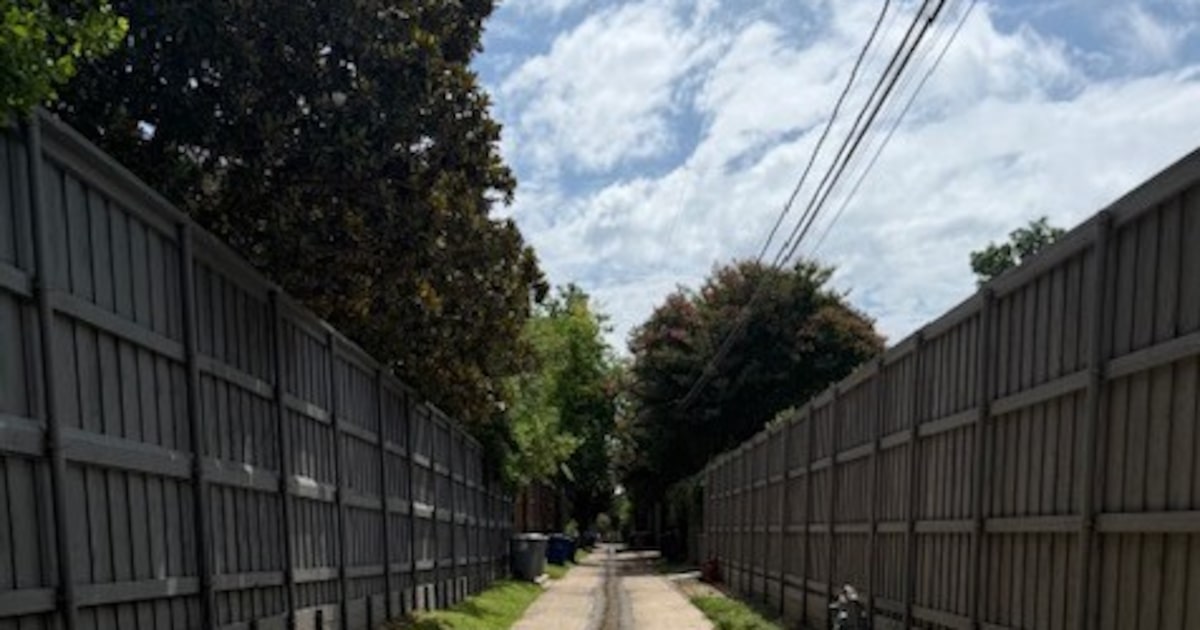The city of Dallas Sanitation Department, with support from the city manager, has proposed eliminating alley trash collection for over 30,000 households, citing safety, equipment utilization and financial concerns. Our group, the Keep Alley Trash Neighborhood Coalition, represents thousands of these households across all 14 council districts, fighting to preserve this vital service.
Numerous Dallas neighborhoods built in the 1950s–70s were meticulously designed around alley service for trash collection and utility access. Many have received alley collection for over 70 years without major incident. So why change now? The city cites safety, efficiency and cost, but has yet to provide supporting data justifying these changes despite repeated requests. Typically, when city codes change, existing infrastructure is “grandfathered” to minimize disruption. Why should alley trash pickup be treated differently?
The city has long neglected alley maintenance. The recent discussion about demolishing the I.M. Pei-designed City Hall due to deferred upkeep reflects a broader pattern: Delay maintenance until it becomes a crisis. These alleys were built to support utility and city services. Forcing homeowners to reconfigure properties to receive basic services — because the city failed to maintain infrastructure — is unfair and costly. Worse, if alleys are abandoned for trash pickup, they’ll likely fall further into disrepair and become sources of urban blight.
Residents have an obligation as well and are ready to help. We’ve proposed a joint task force with sanitation staff to address alley conditions and educate neighbors about their responsibility to keep alleys clear. We’ve also urged the city to enforce code violations. So far, our offer has gone unanswered, but we remain hopeful.
Opinion
Proposed cost increases are another confusing issue. In June 2024, the Sanitation Department told the City Council that alley service cost $9.56 a month more than curbside. Yet in a September 2025 memo, just 15 months later, they claimed alley service would cost $69.87-$80.81 a month — an increase of $26.86-$37.80 over current rates. No explanation was provided for this dramatic shift. Surely other options exist to mitigate costs. One is outsourcing to private operators, many of whom already work with the city.
Other municipalities do this successfully. Highland Park, with older homes and narrow alleys, offers twice-weekly trash and recycling for $37.05 a month via an outsourced provider. Addison and Allen, with newer infrastructure, pay around $20 a month. Dallas residents currently pay $43.01 month, despite the city’s scale and ownership of its landfill. Why can’t Dallas match or beat these rates? Perhaps the answer is operational efficiency.
A July 2024 city auditor report raises serious concerns about the Sanitation Department’s operational effectiveness. It cited lack of written procedures, poor safety oversight and inadequate training. Sanitation workers we spoke to describe their training as “half a day in a parking lot with a safety vest.” What’s been done to address these issues and have they contributed to the challenges the city now sites as justification for the proposed changes? If the department can’t implement basic services effectively, why should residents suffer?
More than 11,000 citizens have signed our petition to keep alley service. In the city’s own 2022 Solid Waste Management survey, 67% of residents opposed moving service to the curb. Instead of another survey, city staff should explore outsourcing or other cost-effective solutions to preserve a service residents clearly want. If the Sanitation Department won’t, the City Council should hold the city manager accountable.
Dallas was Founded 184 years ago by John Neely Bryan as a small trading post along the Trinity River. Since then, thousands of Dallas residents, community and civic leaders have come together to cooperatively overcome challenging issues to make Dallas the internationally recognized city it is today. Many of those issues likely had “easy” solutions that were ignored in favor of the “right” solutions which benefited the city’s residents. We are sure the city staff feels the “easy” solution is simply moving the trash collection service from alleys to the curb. We respectfully ask them not to do things the “easy” way; do them the “Dallas” way. We are anxious to help.
James Collet and Jeff Helfrich are Dallas residents leading the Keep Alley Trash Neighborhood Coalition.
We welcome your thoughts in a letter to the editor. See the guidelines and submit your letter here.
If you have problems with the form, you can submit via email at letters@dallasnews.com

